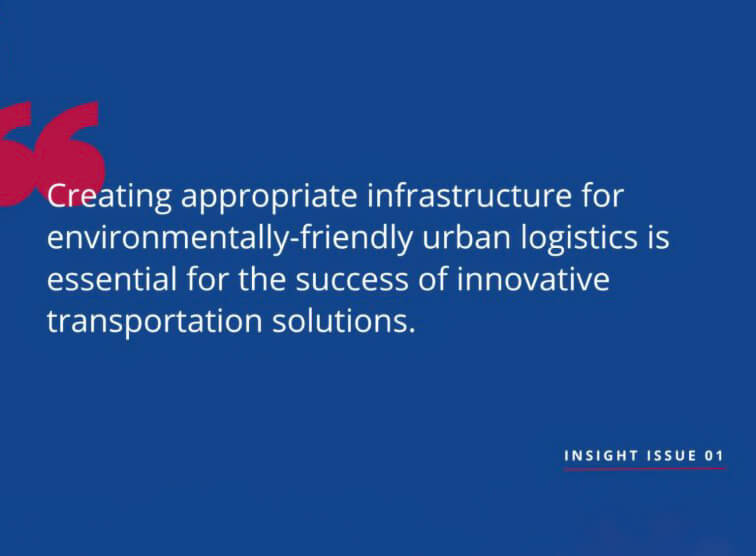Insight 01: Logistics for liveable cities
Eliminating empty runs, electrifying vehicle fleets and bundling deliveries through AI are a few possible methods to reduce CO2 emissions in future cities. With cargo bikes and e-mobiles already operating on the last miles – as well as drones and delivery robots undergoing testing – the logistics industry is constantly innovating.
Small, light, autonomous logistics vehicles, such as the models developed by the Aachen-based start up Droiddrive, are another new idea popping up on the scene. Additionally, there are efforts to transport goods through public transport systems, such as trams in cities like Schwerin.
All of these possibilities have one thing in common: They require suitable infrastructure. This includes creating parking and charging stations, developing battery exchange points for vehicles as well as setting up decentralised, smaller warehouses to cover the last mile. These warehouses, so-called microhubs, need to be strategically located throughout the city and easily accessible by larger vehicles for stocking. Once goods are at the microhubs, they can be distributed to their final destination using cargo bicycles or other modes of transportation.
Finding properties that are suitable for microhubs in sufficient numbers is a challenge. Containers or vehicles are sometimes used, as they can easily be parked on the side of the road in strategic locations. Vacant shops or rented space in multi-storey car parks can also serve as microhubs. Demand for such solutions is growing, according to a customer survey conducted by real estate provider Mileway. Microhubs are crucial to achieve environmentally friendly forms of last-mile delivery, such as the orderer collecting the shipment on foot or by bike.
But in addition to the last mile, it’s crucial to also consider the initial delivery to urban depots and shops. Innovative ideas are also being explored to tackle this issue, including the use of public transport and e-trucks. Hamburg, for example, is even exploring the use of waterways and tunnels.
Venice as a model
Hamburg’s abundance of waterways, including the Elbe and its arms, the Alster, Bille and various canals, make it well-suited for small barges to navigate – similar to Venice or Amsterdam. This solution could potentially alleviate some urban commercial traffic. Similar projects have been implemented in London and Paris, and research is currently underway in Berlin for autonomous small barges. The feasibility study “Water Cargo Barge” conducted in 2021 by the Fraunhofer Center for Maritime Logistics and Services (CML) revealed that the CEP industry is interested in such a model, particularly if the transport ships can double as floating microhubs for final distribution via cargo bikes. While the economic feasibility depends on the type and quantity of goods, using e-boats instead of diesel trucks would have a positive environmental impact and help relieve the road network from freight transport congestion.
In 2022, the EU-funded project “Decarbomile Revolutionizing Last Mile Logistics in Europe” launched with a four-year financing plan as part of the EU Horizon Europe Research and Innovation Programme. The project aims to test various concepts in four “living labs” located in Hamburg, Nantes (France), Logroño (Spain) and Istanbul (Turkey). In Hamburg, TU Hamburg, New Mobility Solutions, Logistics Initiative Hamburg and DHL are collaborating to develop a waterborne logistics chain as a sustainable and efficient last-mile delivery solution.
Delivering goods into city centres through tunnels is not a new idea. “Cargo Cap” was already being discussed in the 1990s, and Switzerland has been working on the “Cargo sous terrain” project for several years now, with plans for a network of 450 km already in place. In Hamburg, the “Smart City Loop” is a 2.5 km long freight tunnel from a logistics centre in Steinwerder to a city hub at the exhibition centre. The feasibility study and profitability calculations for this project have been positive, and some retail chains have already expressed interest. In just a few years, driverless transport units will be able to carry standardised transport units, such as pallets, through this tunnel, replacing 1,500 trucks on Hamburg’s roads every day. According to the project’s initiators, this could lead to a reduction of 30,000 tonnes of CO2 emissions per year.
To revolutionise city logistics, it is crucial to foster collaboration between industry, trade, logistics, citizens, cities and municipalities. Developing population-compatible solutions should be a top priority, instead of banning logistics services in cities. Without adequate logistics services, the quality of life in any given urban location will suffer, underlining the importance of working together to address this challenge.
MBS lives sustainability
MBS embraces a holistic stance on sustainability – economically, ecologically and socially. From bundling flows of goods to avoid unnecessary transports to handling natural resources with care, the company is committed to responsible and innovative planning. MBS also empowers its customers to make environmentally responsible decisions by providing a CO2 calculator for every transport. This tool helps customers determine emissions, and MBS offers opportunities to compensate emissions via a non-profit organisation. For MBS, responding to people, planet and profit imperatives is crucial to building long-term business success.
